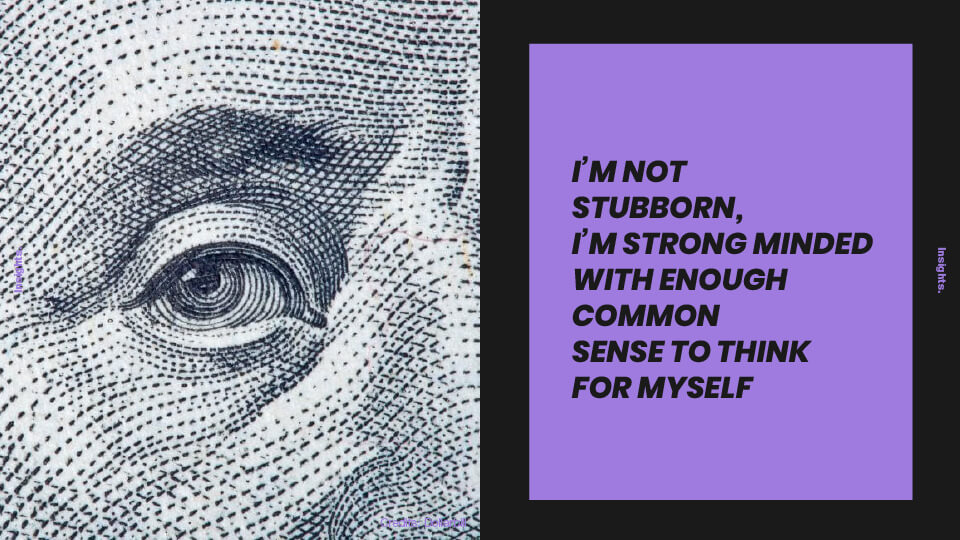Our future might depend on being bad
Humanity
Our future might depend on being bad
In journal nr. 2, we already touched upon the rise of general AI, where the systems possess the same cognitive abilities and understanding of its environment as humans, coupled with the ability to process data at much greater speeds than humans. AI will even become more creative than us. Our creativity and intuition will become predictable through algorithms and self-learning AI. These systems are going to make decisions for us, and we will blindly trust them.
Online algorithms are already keeping track of our ideas and choices and then create similar proposals, and this will only increase in the future. But what if you want to change? How will you do that? You’ll be fed ideas by your own algorithm, which will make you stop questioning your motivations. You’ve become a follower of your own algorithm…
Being ‘bad’ is good
To change the world you start with yourself. We advise you to develop traits that aren’t always seen as positive, such as: UNPREDICTABILITY, STUBBORNNESS, INEFFICIENCY, FICKLENESS, RECKLESSNESS or even RASHNESS. Pick at free will, one you would like to develop. As it’s unlikely that these characteristics will be programmed for AI algorithms.These human traits are exactly what is needed for disruption, for break-throughs and revolutions. They for instance led to inventions, insights and discoveries in the past.
Think of Alexander Fleming, who, as the story goes, found the petri dishes in his lab contaminated with a type of mould upon returning from his holiday. Instead of throwing them out, he dove right in and accidentally discovered penicillin. It’s the basis of our antibiotics, used to combat infectious diseases. Making mistakes might be a really importanttrait in a world of ever-more perfect AI’s.
Make up your own mind
Beside being ‘bad’, think critically. Defined by the Foundation For Critical Thinking as “the intellectually disciplined process of actively and skilfully conceptualising, applying, analysing, synthesising, and/or evaluating information gathered from, or generated by, observation, experience, reflection, reasoning, or communication, as a guide to belief and action.”, it can serve as an antidote to blind obedience.
Keep in mind
It has become really hardto choose independently, because we’re overwhelmed by the abundance of options we have today. It’s what psychologist Barry Schwartz talked about in his famous TED talk: we have so many options, which should feel liberating, but has a paralysing effect on us. Indeed, an abundance of choice makes us dissatisfied, rather than happy.How to choose? First, establish if this a decision that matters. Values matter, don’t sweat the small stuff. Make decisions that are consistent with your core beliefs and values. The alternative invariably leads to regret.
Know what you know and what you don’t know. Don’t try to be an expert in everything. Seek input and advice when variables lie outside your comfort zone.

ake note that 95% of your decisions are made unconsciously. Your brain is very capable to process great amounts of variables and make up your mind. Best to take in the information and sleep a night. This gives your brain the time to process it. History is filled with stories about prophetic dreams, showing how to solve a problem. (Like Mendeleyev’s dream to solve the periodic table that gave us our understanding of chemistry.)Also keep note to the first thing that pops-up in your brain while waking up, that is often your subconscious talking to you.
Don’t procrastinate. You’ll rarely have all the information that you need to make a “perfect” decision. So don’t demand perfection. The philosopher Voltaire warned against letting the perfect be the enemy of the good. That advice still holds true today.
Once you make a decision, don’t look back constantly, make it work. Don’t second-guess yourself. You can’t relive the past. It’s a waste of valuable time and energy. If it doesn’t work after a significant time, you can always make a new decision, and you have gained more experience with it.
No need to punish yourself in hindsight for making the decision you made, you made the best choice based on information you had.
Next time you are about to make up your own mind about the future, please keep this article in mind.
We have done our best to give credit to all whose imagery we have used in this presentation. However, in an era of digital sharing and social media, it is not always possible to identify the original source. Please contact us to add the correct credits: we@tchai2021.henrihoogeveen.nl